Business in Canada, Toronto, Quebec

Canadian International Trade and Economy, Aerospace, agribusiness
- Introduction to Canada
- Canadian Economy
- Canadian competitive advantages
- Case Study - Top Canadian industry sectors:
- Aerospace
- Agri-food
- Automotive
- Software
- Canadian International Trade
- Investment in Canada
- Business in Ontario - Toronto
- Business in Quebec
- Case Study: Asia-Pacific gateway and corridor initiative
- Access to the Canadian Market
- Business Plan for Canada
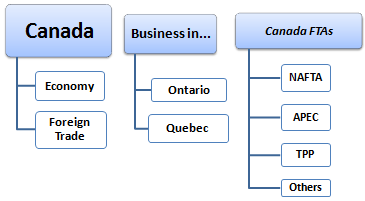
The objectives of the subject “International Trade and Business in Canada” are the following:
- To analyze the Canadian Economy and Global Trade
- To know the trade opportunities in Canada
- To explore the Canadian trade relations with the country of the student
- To know the Canadian Trade Agreements
- To examine the profile of Canadian Companies
- To develop a business plan for the Canadian Market

The Subject “Foreign Trade and Business in Canada” belongs to the following Online Programs taught by EENI Global Business School:
Doctorate: American Business, World Trade.

Masters: International Business, Foreign Trade.

- Credits of the subject “Doing Business in Canada”: 2

- Duration: two weeks
 Masters adapted to Canadian Students.
Masters adapted to Canadian Students.
International Trade and Business in Canada

Canadian Preferential Access and Trade Agreements:
- Canada and the North American Economic Area
- USMCA
- APEC
- Agreement for Trans-Pacific Partnership)
- EU-Canada Agreement
- Trade Agreements;
- Canada-EFTA
- Canada-Jordan Agreement
- ASEAN-Canada Agreement
- UK-Canada Agreement
- Canada-India Agreement
- Canada-Honduras Agreement
- Canada-Panama Agreement
- Colombia-Canada Agreement
- Peru-Canada Agreement
- Chile-Canada Agreement
- Canada-Costa Rica Agreement
- Canada-Ukraine Agreement
- Canada-South Korea Agreement
- Canada-Israel Agreement
- SICA (observer country)
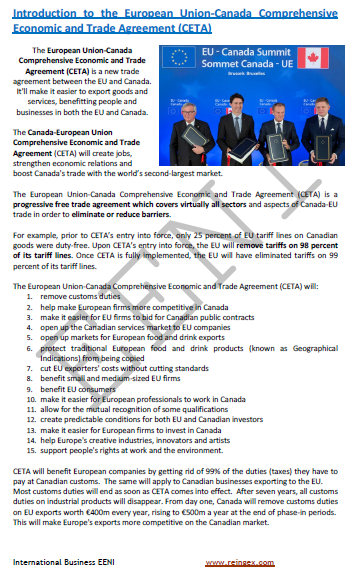

- WTO
- GATS
- Agreement on the Application of Sanitary Measures
- Agreement on Technical Barriers to Trade
- Agreement on Preshipment Inspection
- Agreement on Safeguards
- Trade Facilitation Agreement
- WCO
- BIC (Containers)
- Chicago Convention (ICAO)
- IMO
- Customs Convention on Containers
- Istanbul Convention
- ICS
- IRU
- TIR Convention
- Guidelines on Safe Load Securing for Road Transport

American Trade and Economic Organizations. Canada is a member of:
- Inter-American Development Bank (IADB)
- ECLAC
- Asian Development Bank
Global Organizations:
- OECD
- UN
- WB
- WTO
- IMF
- African Development Bank
- PEEC
- Regional Cooperation Council
- Canadian population: 35.7 million people
- Area of Canada: 9,984,670 km² (the world's second-largest country, the first is Russia)
- Canada shares its border with the U.S.
- Capital of Canada: Ottawa
- Business City: Toronto
- Canada has two official languages: English and French (Quebec and Montreal)
- Canada gained the independence from Britain in 1867. Since then the Queen is the Head of State
- Abolition of Slavery in Canada: (1834)
- African Diaspora in Canada: 0.8 million people (2,7% of Canadian population)
Main religion in Canada: Christianity:
- Catholicism (14 million)
- Protestants (9 million, 29% of Canadian population, Methodists)

Canada belongs to the North American Economic Area (Western Civilization).
Canadian Economy.
- Canada is the top-ranked nation in the OCDE for both lowest number of procedures (2) and shortest duration for termination (3 days) to incorporate a business (WB)
- Canada is one of the safest countries to invest
- Business of Canada “Welfare Potential Index” ranks Canada first in the G-7
- Canada is the fifth-largest aerospace producer in the World
- Canada is the fourth-largest agricultural export producer in the World
- Canada is the third largest automotive products exporter
- Nine of the top ten chemical companies in the World have production facilities in Canada
- Canada is one of the five world leaders in biotechnology
- Canada ranks number one in the OECD in higher education
- Ontario Region (Toronto) is the Canadian economy engine (42% of the exports of Canadian products)
- Currency: the Canadian dollar (CAD)
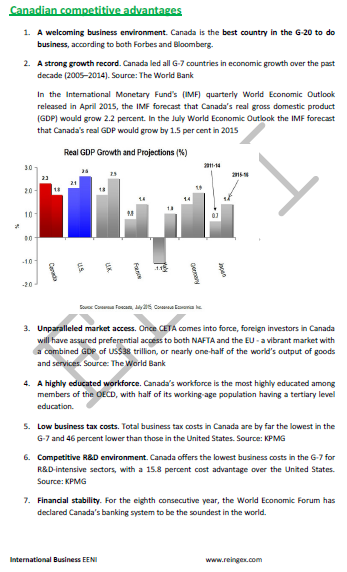
Global Trade and Business in Canada:
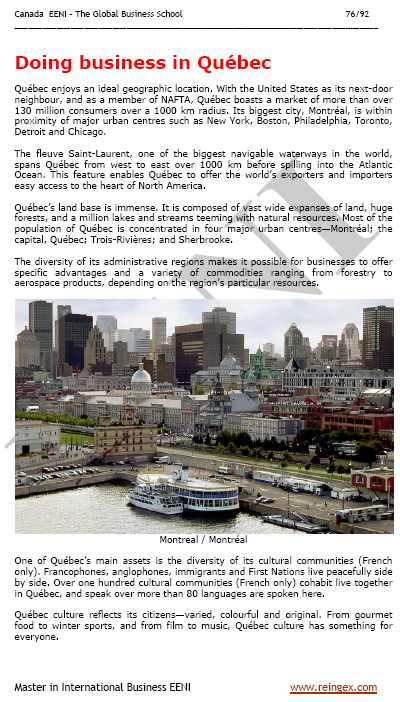

Canadian International Trade.
- Canada is the largest trading partner of the U.S. (the U.S. generate more trade with Canada than with all the countries of the EU)
- Canadian largest trading partners are the U.S., China, Mexico, Japan, and the EU
- Quebec and Ontario are closer to New York, Boston, and Chicago than many industrial cities in the U.S.
- The Asia-Pacific Gateway and Corridor Initiative is an association of public resources and private sector to take advantage of Canadian strategic location at the crossroads between the North American market and the Asian emerging economies
- The markets of the EU provides business opportunities for the exporters and importers of Canada.
- Top Canadian Exports to the EU: chemicals, machinery, international transport equipment, computer electronics products and minerals
- The EU represents the second-largest trade and investment partner of Canada
- The countries of the EFTA are also important economic partners for Canada. International Trade Canada-EFTA: $13.2 billion, including exports of $4.2 billion
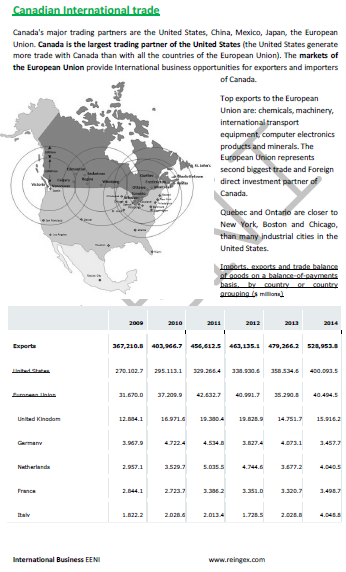
Canadian Trade Agreements
Under the North American Free-Trade Agreement (USMCA/NAFTA 2.0), Canada has direct access to the North American markets, including Mexico and the U.S. (the largest trading partner of Canada).
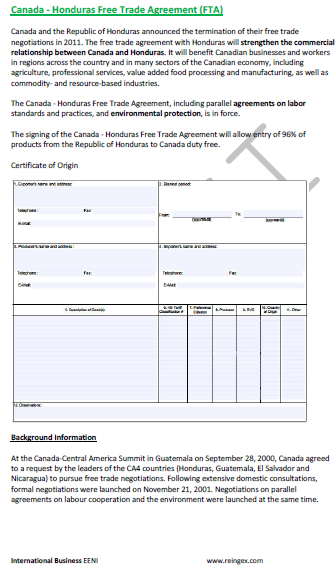
(c) EENI Global Business School (1995-2024)
We do not use cookies
Top of this page



 or
or 
